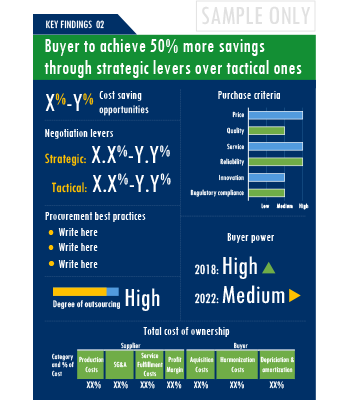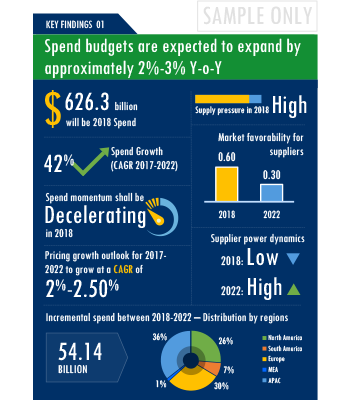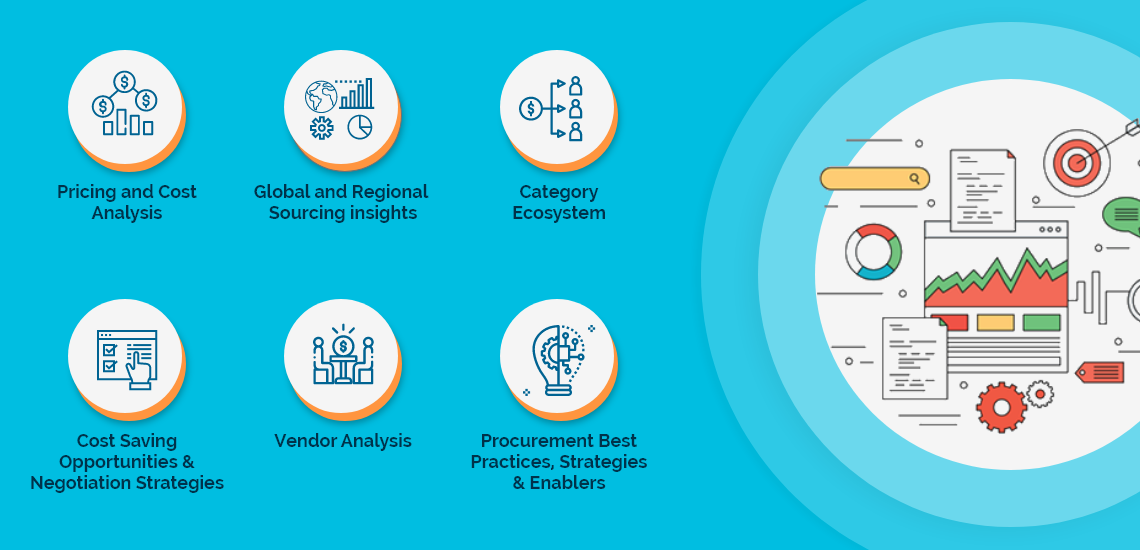Access curated Meteorological Instruments procurement intelligence and solve all your questions on Meteorological Instruments procurement outlook, cost saving opportunities in Meteorological Instruments procurement and potential Meteorological Instruments partners.
GET FREE SAMPLEMeteorological Instruments is an essential part of the Engineering Products and Equipment category which includes all spend related to the provision of goods related to the operation of industrial and engineering services, including machines, equipment and supplies related to cranes, engines and machinery, measurement and testing, hardware and instruments.
The market for Engineering Products and Equipment and its sub-segments such as Meteorological Instruments are at an interesting intersection. Regulatory guidance on data protection and increasing concern over cybersecurity have increased the costs for suppliers as they incur additional spend on compliance and security. These additional costs have a potential to drive marginal increase in prices across the key geographies.Procurement costs for Meteorological Instruments are highly impacted by an increase in the costs associated with the value chain of Meteorological Instruments, such as logistics, labor cost and energy. Additionally, outdated assets are also increasing the cost for suppliers.Technology is improving productivity and creating fresh demand. Convergence of data science, automation tools, 3D printing, robotics, AI and big data has opened up multiple possibilities to better serve customers at a lower operational cost.Trends like these and many others discussed in this report are necessitating a relook at the way Meteorological Instruments is procured and the procurement cost saving opportunities that exist.
As market conditions become more dynamic and procurement practices get more sophisticated, category managers need to be cognizant of the best practices that work for their Meteorological Instruments category procurement. The report offers a succinct analysis of Meteorological Instruments procurement best practices. For example, Buyers should engage with suppliers that have recycling capability. Recycling capability of the suppliers will lower their production costs which will be passed on to buyers. Additionally, the recycling capability will contribute in furthering the sustainability goals of the buyers' organization. Buyers should assess the level of adoption of the latest technologies by suppliers to assess cost-saving opportunities and quality that can be provided by the latter. For instance, the adoption of technologies such as cloud computing will enable suppliers to reduce their internal computing hardware requirements for operations such as CAD and CAM. This can, in turn, enable them to reduce their operating costs, thereby suppliers can offer products at lower rates to buyers. Competitive bidding as a cost optimization tool is extremely potent but should be carefully deployed only when there is no significant differentiation among Meteorological Instruments suppliers.
Activate your free account to gain easy access to cutting edge research and insights on consumers, emerging price trends, global and regional suppliers.
Meteorological Instruments procurement managers also need to proactively identify and mitigate potential risks that can arise in the supply chain or contracts for Meteorological Instruments procurement. Some examples include:
For detailed insights and complete access to our report library, activate your free account!
The report is intended to serve as a one-stop reference guide for Meteorological Instruments procurement strategy and offers a perfect blend of category basics with deep-dive category data and insights. Therefore, it is ideal for category beginners looking for “Meteorological Instruments: Procurement Report 101” as well as for category experts actively tracking the global Meteorological Instruments procurement market.
You may have just initiated your research to design a winning Meteorological Instruments procurement strategy, or you may be a category expert looking for strategic insights and updated data.Either ways, the report has your requirements covered.

Unlock SpendEdge's comprehensive procurement report collection with ease through our procurement platform.
Procurement decisions can prove to be costly in the absence of careful deliberation and evaluation of every available option. In fact, more than 90% of the decision makers we work with acknowledge that timely availability of up-to-date category intelligence can help them make better purchasing decisions. More than 80% of them believe that in-house category intelligence needs to be updated periodically to achieve full benefits. If you have read so far, we are quite sure you agree!!
The Meteorological Instruments procurement report helps take more informed decisions by placing all the critical information and advice at the fingertips of a decision maker. It also specifically answers some of the key questions that we have been routinely asked during our industry outreach initiatives:
SpendEdge Insights has helped procurement professionals and sourcing teams manage multiple spend areas and achieve more than $2 billion in savings. Activate your free account today!
The Meteorological Instruments market report offers a complete picture of the supply market and analyzes the category from the perspective of both buyers and suppliers. Analysis of the category trends, procurement best practices, negotiation levers and overall category management strategy advisory are interspersed with in-depth data and commentary on spend outlook, pricing ecosystem and supplier landscape drilled down to a region-level coverage.

A key highlight of this report is the in-depth outlook created on Meteorological Instruments procurement spend and pricing trends. The report further delves deep into the aspects of cost structure, total cost of ownership and supplier margins for Meteorological Instruments. A dedicated section to supplier profiles and evaluation helps decision makers cast a wider procurement net and identify gaps in existing relationships.

Along with specific category and supplier intelligence, the publication also includes curated insights on Meteorological Instruments market trends, price influencers and inherent risks. These insights help the decision makers prepare for market shaping trends in advance and create alternative strategies for changes in the market conditions.

Additionally, the report also advises on the best practices and strategies to manage the Meteorological Instruments category efficiently. Negotiation levers and opportunities are explained in detail along with quantification of their potential. Benchmark KPIs for supplier and buyer performance management are also aggregated to better organize the category objectives. Other themes of advisory include ideal procurement organization structure, enablers to achieve KPIs or category objectives and ideal SLAs to have with suppliers.






Our research is complex, but our reports are easy to digest. Quantitative analysis and exhaustive commentary is placed in an easy to read format that gives you an in-depth knowledge on the category without spending hours to figure out “what does it mean for my company?”


SpendEdge presents a detailed picture of Meteorological Instruments procurement solutions by way of study, synthesis, and summation of data from multiple sources. The analysts have presented the various facets of the market with a particular focus on identifying the key category influencers. The data thus presented is comprehensive, reliable, and the result of extensive research, both primary and secondary.

Global Coulometers Market - Procurement Intelligence Report

Global Hydrographic Instruments Market - Procurement Intelligence Report

Global Rheometers Market - Procurement Intelligence Report

Global Geological And Geophysical Instruments Market - Procurement Intelligence Report

Global Laboratory Analytical Instruments Market - Procurement Intelligence Report

Global Feed Analyzers Market - Procurement Intelligence Report

Global Flowmeters Market - Procurement Intelligence Report

Global PCBA Test Equipment Market - Procurement Intelligence Report

Global Pycnometers Market - Procurement Intelligence Report
Access this report and our entire procurement platform | Plans starting from USD 3000/ Year Buy Now
Copyright © 2025 Infiniti Research Limited. All Rights Reserved. Privacy Notice – Terms of Use – Sales and Subscription
Cookie Policy
The Site uses cookies to record users' preferences in relation to the functionality of accessibility. We, our Affiliates, and our Vendors may store and access cookies on a device, and process personal data including unique identifiers sent by a device, to personalise content, tailor, and report on advertising and to analyse our traffic. By clicking “I’m fine with this”, you are allowing the use of these cookies. You may change your settings based on a legitimate interest at any time, by selecting “Manage Settings” on our site. Please refer to the help guide of your browser for further information on cookies, including how to disable them. Review our Privacy & Cookie Notice.
